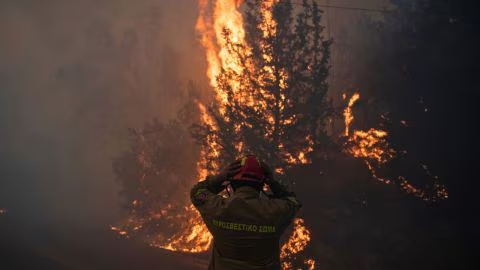A terrifying wildfire has erupted near Athens, Greece, with flames reportedly reaching as high as 25 meters, threatening nearby communities and forcing mass evacuations. The fire, driven by strong winds and scorching temperatures, has quickly spread across the parched landscape, engulfing homes, forests, and farmlands in its path.
The blaze began in the early hours of the morning in a densely wooded area to the northwest of Athens. Within hours, the fire had intensified, fueled by dry vegetation and gusty winds, making it nearly impossible for firefighters to contain. The towering flames and thick smoke have created a chaotic and dangerous situation, as emergency services battle to bring the inferno under control.
Local authorities were quick to respond, deploying hundreds of firefighters, helicopters, and planes to the scene. Despite their best efforts, the sheer scale of the fire and the difficult terrain have made it a formidable challenge. The fire’s rapid spread has led to the evacuation of several villages and settlements in the region, as residents were forced to flee their homes with little more than the clothes on their backs.
The smoke from the fire has darkened the skies over Athens, creating an eerie and ominous atmosphere in the city. The Greek government has declared a state of emergency in the affected areas, and citizens have been urged to stay indoors and avoid unnecessary travel. Hospitals in the region are on high alert, prepared to treat victims of smoke inhalation and other fire-related injuries.
For many residents, this wildfire brings back painful memories of previous fires that have devastated parts of Greece in recent years. The country has been increasingly vulnerable to such disasters, with climate change exacerbating the frequency and intensity of wildfires. The current fire is one of the most severe in recent memory, and officials fear that it could continue to burn for days if not contained soon.
As the fire rages on, the Greek Prime Minister has called for international assistance, requesting help from neighboring countries and the European Union. In response, several nations have pledged to send additional firefighting equipment and personnel to aid in the battle against the flames. The Greek government has also mobilized the military to assist with evacuations and logistical support.
The environmental impact of the wildfire is already devastating, with vast swathes of forest and wildlife habitats destroyed. The long-term effects on the local ecosystem are expected to be severe, with the loss of biodiversity and the increased risk of soil erosion and flooding in the aftermath of the fire.
In addition to the environmental damage, the economic toll is likely to be significant. The fire has destroyed homes, businesses, and agricultural land, leaving many people facing an uncertain future. The cost of rebuilding and recovery will be enormous, and the Greek government is expected to seek financial aid from international organizations to assist with the recovery efforts.
As firefighters continue their relentless efforts to contain the blaze, the situation remains critical. The unpredictable nature of wildfires means that conditions can change rapidly, and there is a constant risk of the fire spreading to new areas. The focus now is on preventing further loss of life and minimizing the damage to property and the environment.
The people of Greece are no strangers to hardship, and their resilience will be tested once again as they confront this latest disaster. In the face of such overwhelming adversity, communities are coming together, offering support to those affected and volunteering to assist in any way they can.
As the world watches, the fight against the wildfire near Athens serves as a stark reminder of the growing threat posed by climate change and the urgent need for action to protect vulnerable regions from the increasing frequency of such catastrophic events. The hope is that the combined efforts of the Greek authorities and the international community will soon bring this inferno under control, allowing the healing and rebuilding process to begin.


